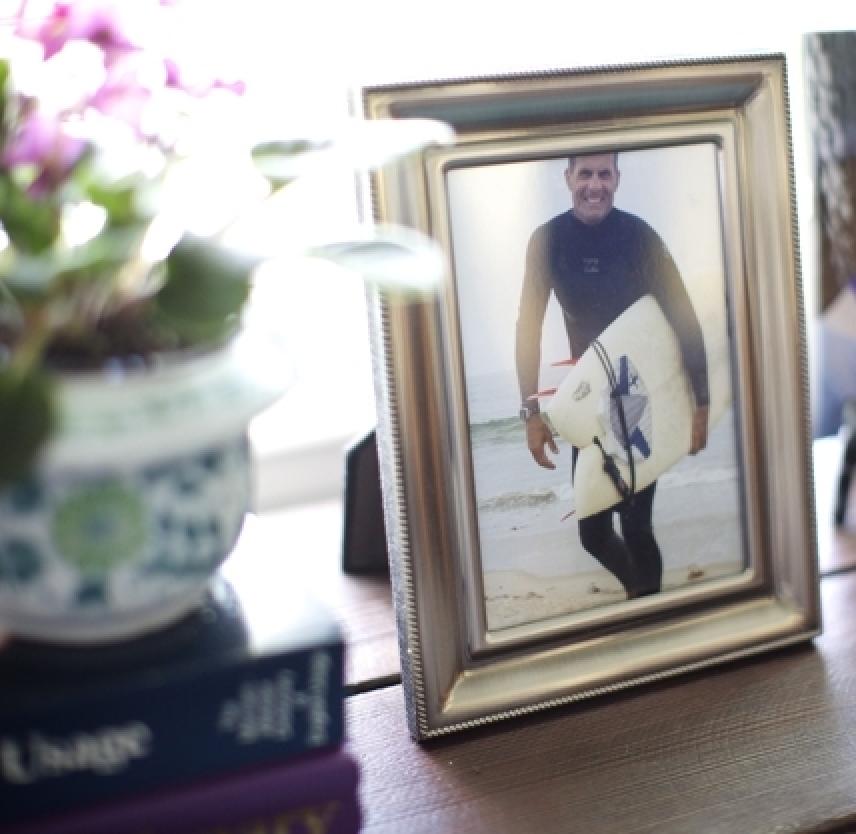
Immediately after Hugh woke up from his coma, I felt a deep sense of loss. Yes, my husband was alive but he didn’t act or sound like my husband at all. The vacant look in his eyes changed his face in a frightening way. Everyone celebrated that he survived, and so did I, but I felt conflicted and didn’t know why. As the weeks dragged on, Hugh continued to make slow progress. He attended rehab sessions to relearn the daily activities of living. His personality fluctuated between flat and agitated.
By week seven, I felt frantic inside. Did I lose him completely? Meeting with the manager of Medical Psychology at HealthSouth helped enormously. She told me that it was common for the spouse of someone with TBI to feel a deep sense of grief, as if that person had died. I later learned that the term for this feeling is “ambiguous loss.” Ambiguous loss occurs when someone we love is still with us, yet radically changed. Pauline Boss, an expert on ambiguous loss, explains this as a physical presence with a psychological absence. Ambiguous loss occurs frequently after a TBI or with Alzheimer’s disease, and it can be distressing for family members.
Here are three statements that hint at a sense of ambiguous loss:
“TBI is like having your house robbed. When you walk through the door, you know things are missing but it takes a long time to figure out what. And sometimes those things sneak up on you when you least expect it.”
— Wife of TBI survivor, Laura Cooper Kitchings
“After my dad was hurt, I lost my father and it felt like I lost my mother, too. Everyone said how lucky I was, but I didn’t feel lucky at all.”
— Daughter of TBI Survivor, Mary Rawlins
“The spouse has a harder time moving forward with life and is in a constant high alert pattern to look for something that is off. This is exhausting! We are always wondering: would he have said that or acted that way before? For the life of me, I can't remember.”
— Wife of TBI survivor, Marlene Phelps
Through counseling, both on my own, and with my husband after his TBI, I was able to cope with feelings of ambiguous loss. Here is some of the advice in counseling that helped me:
- Meet each other where you are now.
- Support each other.
- Try new things together.
- Don’t get stuck in the past.
- Cherish old memories while striving to make new ones.
- Look for qualities you love in each other every day.
- Realize that you may have both changed from this traumatic family experience, that life always changes, but you can find peace in the present if you actively seek it out.
Ambiguous loss is important for people to acknowledge and understand. Knowing that these feelings are natural can be a relief to many family members, and sharing ways to come to terms with this loss is important for family members in the TBI community.

Comments (23)
Please remember, we are not able to give medical or legal advice. If you have medical concerns, please consult your doctor. All posted comments are the views and opinions of the poster only.
Anonymous replied on Permalink
I am an identical twin and my twin sister has a right frontal lobe TBI. I felt loss but
no one understood what I lost. Everyone was so happy that she has done so well,
I too am so pleased. I miss her though...a deep sense of loss. I am now sort of
her mom, but she sees me as her twin sister. It has been 12 years and I still feel
I lost her.
Anonymous replied on Permalink
Anonymous replied on Permalink
Anonymous replied on Permalink
Anonymous replied on Permalink
Anonymous replied on Permalink
Anonymous replied on Permalink
Mariellen Jacobs replied on Permalink
This really hit home. My son's TBI/stroke happened when he had just turned 20. I am so grateful for the amazing miracle of having my "new" son but sometimes still grieve what he/we lost. It's the "grief vs. gratitude" dance that we all learn over time. Like you, I still see glimpses of the "pre-accident" son but more and more I have learned to just love and cherish the wonderful son I have now, challenges, deficits, and all.
Anonymous replied on Permalink
Anonymous replied on Permalink
Anonymous replied on Permalink
Anonymous replied on Permalink
Anonymous replied on Permalink
Anonymous replied on Permalink
Anonymous replied on Permalink
Anonymous replied on Permalink
Anonymous replied on Permalink
AMBIGUOUS LOSS I never knew it had a name. the ones around the TBI person (me) celebrating that her life was saved. The TBI person wondering why they're celebrating because NOTHING IS THE SAME- NOR WILL IT EVER BE!!!
I discussed this in my book- on Amazon- "I Didn't Die Because God Wasn't Finished With Me, YET!!!
Sometimes I wonder why God did save me but I know I have purpose.
Anonymous replied on Permalink
Anonymous replied on Permalink
Anonymous replied on Permalink
Anonymous replied on Permalink
Anonymous replied on Permalink
Nikki replied on Permalink
Thank you so much, up until now I couldn't find anything relating to what I've been experiencing after my husbands TBI. I kept saying that I felt like I was grieving, but he is still with me, and made close to a full recovery, so I was conflicted and didn't understand why I felt such a deep sense of loss. But he has changed in small ways and I feel different after almost losing him. There are plenty of support groups for spouses that lose their partners, but I've been unable to find anything for people that almost lost a partner. The stress following the initial hospitalization and recovery has been immense, and I feel so lonely. It's nice to have a term to understand what I'm going through.